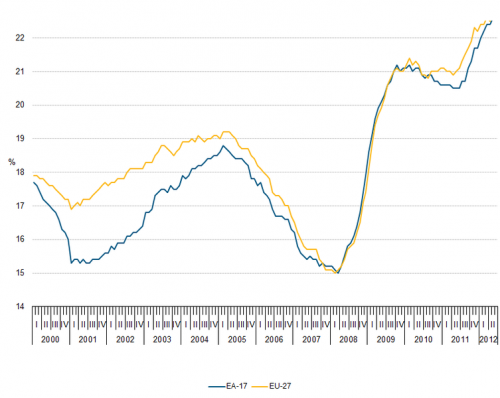Interesting perspective from Norbert Walter a former chief economist of Deutsche Bank Group and head of Deutsche Bank Research. – What Euro Crisis?
Basically, his view;
- There isn’t really an economic crisis in the Eurozone
- If there is a crisis, it could easily be resolved through a bit more immigration and the European Union becoming like Switzerland.
Well, there is more to it than that, and he makes some fair points about countries outside the Euro still struggling (e.g. UK). You can read the full article to form your own opinion. But, it gives a good explanation of the ‘German centric, ECB view’ of the crisis. But, I doubt it will make encouraging reading for those unemployed workers in southern Europe.

My biggest cause for concern is the idea that you can have unemployment rates of 10-25% but not really have an economic crisis.
It is related to the over-riding obsession with low inflation and stable exchange rates in the ECB. The ECB view seems to be that as long as inflation is low, things are OK.
But, mass unemployment alone is enough to damage society, damage the prospects of young people, encourage political extremism and lead to a waste of human potential. This is why I want the ECB to have a dual mandate – and not just inflation targeting.
It seems the hyperinflation of the 1920s, forever remains a scar on the German consciousness. But, it wasn’t inflation, but mass unemployment that caused the real political disaster in the early 1930s. There was no inflation in the 1930s, but that was scant comfort to the 6 million unemployed.
Norbert Walter asks why can’t the EU become like Switzerland – four different languages, but a model for economic integration?
It is a good ideal, but how realistic is it for Spain’s unemployed to travel up north and be welcomed by northern Europe? Would Germany welcome thousands of migrant workers?
Unemployment rates vary across Europe, but even in Germany supposedly the star economic performer, there is no sign of full employment. Germany itself has an unemployment problem, which is feeding dissatisfaction with the Eurozone. I don’t see how immigration can solve the underlying 10% unemployment across the European Union.
Why Can’t Everyone be Like Germany?

Walter makes the point that before entry to the Eurozone, Germany was struggling with low productivity and a stagnant economy. Structural reforms in Germany helped change that leading to productivity growth and the boom in German exports. Walter suggests that if only other countries could implement the same structural policies and promote productivity growth, Europe’s structural problems will evaporate.
But, when you look at what has happened to the economy of Greece, Spain, and Italy in recent months, there is a fundamental collapse in demand. Restoring full employment through deflationary and supply side policies will take years of massive economic pain.
However, if one problem is lack of productivity growth in southern Europe, it may be worth considering the other side of the equation. – Germany is too export oriented. The Eurozone could also be rebalanced through pursuing higher inflation, and higher consumer spending in Germany and other current account surplus countries. But, would the German economic elite be willing to adopt a strategy for promoting growth and consumer spending.
European Political Union
There is no harm in having a vision of political and fiscal union. Europe could benefit from more flexible labour markets, greater productivity and greater fiscal integration. A common Eurobond would give peripheral countries breathing space to tackle debt problems without having to resort to self-defeating austerity.
But, given current crisis (and it is a crisis) supply side policies and increased flexibility is not enough. The Eurozone shows no signs of being an optimal currency area. Europe needs a clear strategy to reduce debt through growth, not reduce debt through austerity.
Given the current failure of the Euro, there needs to be dramatic change in many areas, including greater fiscal union. Otherwise, Germany would be better off leaving the Euro.
